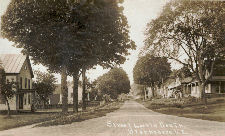The Orton Family Foundation and Vermont Land Trust have launched an initiative to enrich the context for towns’ long-term planning by integrating the arts more fully into their process of deliberation. Communities from all around Addison County applied for a grant that would support a two-year trial of such an approach, and Starksboro’s was the winning application. The committee that wrote it described their town as an “ecotone,” a term drawn from the science of ecology that refers to the boundary zone where two different ecosystems meet. Its applicability to Starksboro is twofold. This is a community situated at the edge between the agricultural lands to the west in Addison County and the heavily wooded uplands beside the Green Mountains. It is a rural town whose character is strongly influenced by its farms, sugarbushes, and forestry, and at the same time a convenient place to live for commuters to Burlington, Middlebury, and even Montpelier. In this latter regard, especially, Starksboro might be seen as a laboratory for a deeply rooted community’s ability to maintain its distinctive identity amid the pressures for sprawl.

This class will kick off the two-year experiment by collecting Starksboro’s stories of place and helping to shape them into useful resources for the town’s residents. With the full cooperation of the town, as well as of Orton and VLT, we will interview senior citizens, elementary school students, and college students looking back at their hometown; farmers, loggers, sugarmakers, teachers, artists, and mill owners; members of the founding families, newcomers, town officials, and people who live in the town’s three large trailer parks. We will build on these interviews through a variety of publications and presentations. These may include a pamphlet collecting interviews and photographs; digital stories that include audio, video, and links to pertinent sites on-line; a map-based interface identifying key sites in Starksboro, along with citizens’ recollections, associations, and concerns about them; and a concluding meeting where we hand our work over to the members of the town. “Portrait of a Vermont Town” will thus be a course that calls on every student for a considerable degree of independence while at the same time offering a rare synthesis between our own academic pursuits and a civic project of a remarkably ambitious, inclusive, and democratic sort.
The following people generously supported the conception and planning for this ambitious new course: Bill Roper and Betsy Rosenbluth of the Orton Family Foundation, Gil Livingston and Elise Annes of the Vermont Land Trust, Barbara Ganley of the Center for Community Digital Learning, and Joe Antonioli of Middlebury College’s Digital Media Services.